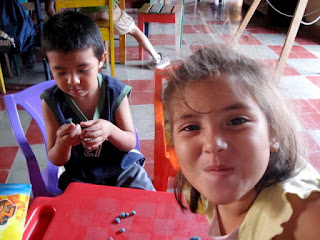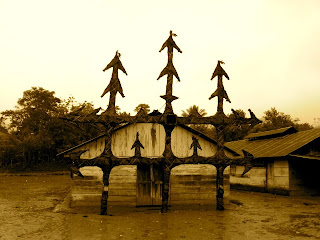One thing I've discovered about Granada is that her tourists are of a slightly different breed. On the streets of Antigua, you could find your Germans, your Swiss, your Canadians, your French, your abundant Americans. You had your retired folk, your hippies, your musicians, your earnest language students, your hopeful volunteers. You could find kids fresh out of college, girls with bleach-blonde hair in little dresses and strappy sandals, guys in board shorts and polo shirts. Antigua has wedged itself onto the beaten path, and all of those shuttles, those buses to and from Panajachel, Quetzaltenango, Chichicastenango, Copan—they make it so easy for us tourists.
But there aren't so many of us here, here beneath the hot Nicaraguan sun. For one thing, you won't see so many nations represented. It's not that Granada doesn't have its draws; it's beautiful here, arguably even more beautiful than Antigua, because this city was built right on the shores of the huge Lake Nicaragua. The man at the front desk of my hotel told me that the lake is dotted with 370 islands, and of those, 3o or so have disappeared for the season, because of all the rain. All of those tiny islands, and so much rocky water. Granada, too, is sprinkled with huge, freshly restored cathedrals; the one that marks the city center is painted a brilliant yellow, and is lined with colonial architecture and mango trees and hums with the bustle of vendors selling fried plantains, Nicaraguan pottery, woven bags. There's nothing here that a tourist wouldn't love.
But, like I said, you won't find the Antigua crowd down here. You won't find, so much, that retired traveler, breaking out of his shell, pushing the limits of his comfort zone along with his lovely, retired wife. Those two stick to Antigua, Lake Atitlan, the ruins of Tikal. They rent Guatemalan vehicles and have purchased beige canvas vests for their adventure, the adventure they've saved their whole working lives to take. Their vests, which they wear both in the mountains and on the colonial, cobblestone streets, have many zippered pockets, designed for the secure storage of their many coins, cameras, maps, trinkets, souvenirs, swiss army knives, and other gadgets. Their quick-drying pants protect them from a foreign country's abundant and unexpected rainfall, and they have purchased very sturdy shoes for marching off the beaten track. They bring floppy, wide-brimmed canvas hats to prevent sunburns, hats they would never wear at home, because although they don't hesitate to get sunburned in their native land, it's a far greater inconvenience abroad.
Nor will you find, here in Nicaragua, the traditional traveling hippy, the hippy with the baggy pants that mark his many months abroad. You won't so often see those baggy pants built with plenty of pockets and room for musical instruments, worn Lonely Planet guidebooks, food purchased in the market, scraps of paper bearing song lyrics and poems scrawled on buses. No, you won't see those so much here, or the stocking caps that hippies love, because pants and hats are made for cold, and god, it is hot here. And so the hippy, with his dreadlocks that have become museums for beads, bones and stones, is also different here.
If I had to pick a word, I guess I'd say that there's something edgy about the Nicaraguan tourist. There's something a little more raw. You won't see many canvas hats, weatherproof pants, woven rainbow purses. What you'll find, instead, are tattoos, funky haircuts, stiletto shoes. You'll see arms dyed every color, stained with twisting naked women, Virgins de Guadalupe, flowers, crosses, night-skies, Nepali script. These tattooed folks drain bottles of beer and count their remaining cordobas, shelling out four or five dollars a night for a dorm-room bunkbed. They live off tortillas, tomatoes, and cups of watery coffee, and if you ask, they'll tell you that they're looking for something a little rougher than what Guatemala provides.
Or maybe that's just what I see. After all, what makes me so special here? What makes me so edgy? I don't have an arm of tattoos, or any interesting clothes; I just have a backpack full of too many books and a bunch of dirty socks. Maybe I'm just seeing what I want, hoping that maybe Nicaragua really is a little rougher, a little wilder, than anywhere I've been so far. But I guess that likely isn't true. Yes, I guess I'm just projecting. These countries do hold a wildness, a lawlessness, that we don't have in the States, but they're also just countries, countries defined by their inhabitants and not by the tourists they attract. Maybe the people here, the people who wake each morning to sell their fruit, to work in their tiendas, to go to their appointments, their universities, their families, roll their eyes when they see these tattooed tourists flitting through town, in and out, in and out. Maybe, to them, we're all the same. It's not our clothes that define us; it's our mission. And so part of me, deep down, hopes that they snicker to each other while we drink our beers and take our pictures and make our quick assumptions. I hope they get a chuckle out of us, how naive we travelers can be, as we bargain for the cheapest ride to the nearest beach, the nearest jungle, the next, best, exhilarating place.











